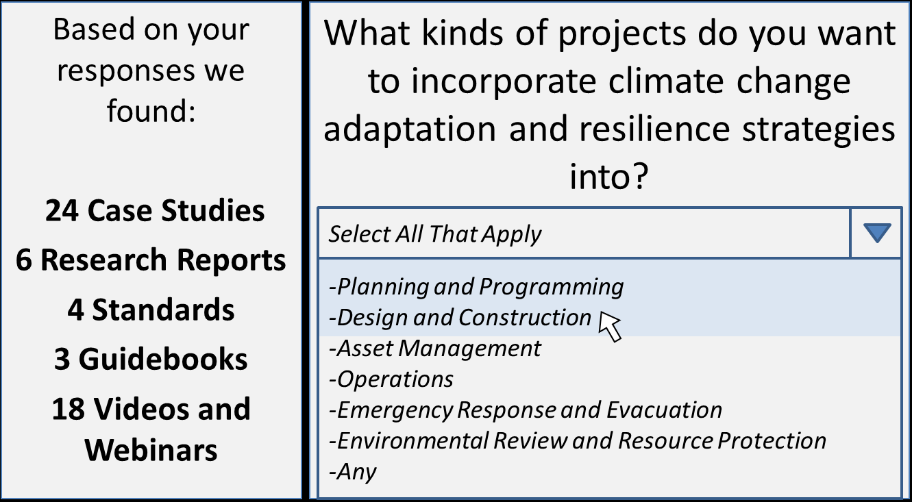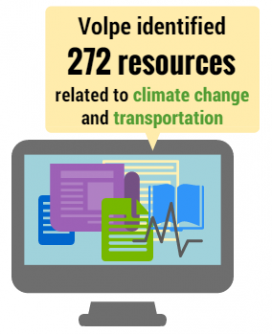Lifting the Burden of Climate Change Information Overload
There’s a saying in America that all politics is local. The aphorism also works when governments address climate change. Federal agencies support data models, research, and projects around the country, but real action to adapt to climate change happens at the state, regional, and local levels.
Still, many states and local governments that are most proactive in identifying how extreme weather affects transportation have not integrated climate change challenges into their planning and operations.
Volpe engineers and analysts, with generous support from OST-R, recently released a final report detailing a concept for a Climate Change Adaptation Expert System for Transportation Practitioners. The Expert System would help transportation practitioners navigate the tangle of resources on climate change resiliency.
This report was created by the team that won Volpe’s 2013 Innovation Challenge.
“We were hearing that people were overwhelmed a bit by all the resources out there,” said Kristin Lewis, an environmental biologist at Volpe and one of the report’s co-authors. “We thought, ‘Maybe there is a role we can take to help.’ We know there are great federal resources, including from DOT agencies. So the question became, how do we help people find those resources?”
The Three Missing Elements
The Volpe team began by identifying 272 federal resources relevant to climate change and transportation, which showed that the universe of resources is large and potentially confusing. The team then spoke with practitioners from seven agencies and reviewed 15 pilot project reports to pinpoint gaps in the resource universe.
After that review and two subsequent workshops, the team identified several elements missing from available climate change resources, including these top three:
- A tool to evaluate costs and benefits of investments related to climate change—not only costs related to infrastructure replacement, but also of economic disruption.
- Predictive tools that show on a regional scale the expected increase in frequency and intensity of extreme weather events.
- Resources and tools to help agencies understand how climate change vulnerability impacts economies, environmental justice communities, and health systems.
“One key thing we heard was that people wanted to be able to integrate climate change analysis and vulnerability risk into existing processes,” Lewis said. “They wanted climate change to become an integral part of what they needed to do.”
Using an Expert System
 After the Volpe team identified gaps in the climate change information universe, they explained how the Climate Change Adaptation Expert System for Transportation Practitioners would work. The system would draw from existing centralized clearinghouses of information, such as the U.S. Climate Resilience Toolkit. Users would be able to quickly navigate hundreds of resources.
After the Volpe team identified gaps in the climate change information universe, they explained how the Climate Change Adaptation Expert System for Transportation Practitioners would work. The system would draw from existing centralized clearinghouses of information, such as the U.S. Climate Resilience Toolkit. Users would be able to quickly navigate hundreds of resources.
While the Expert System is, for now, still just a concept, if it were developed, the interface might look something like personal tax software. A series of simple questions would help guide users toward resources that are the best fit for their agency, region, or project.
The report authors conclude that an Expert System would help users assess how vulnerable their infrastructure is to climate change—and it would help state, regional, and local agencies confidently make decisions using information tailored to their needs.
“Implementing a system like this would take a committed effort from several agencies,” said Kevin McCoy, one of the report’s co-authors. “This would include regular updates to the resource inventory and engagement with state and local users to learn more about the resources they find most valuable. We would welcome the opportunity to work with federal agencies interested in implementing the Expert System concept, or who want to learn more about the research behind the concept.”
For more details, read the final report.

